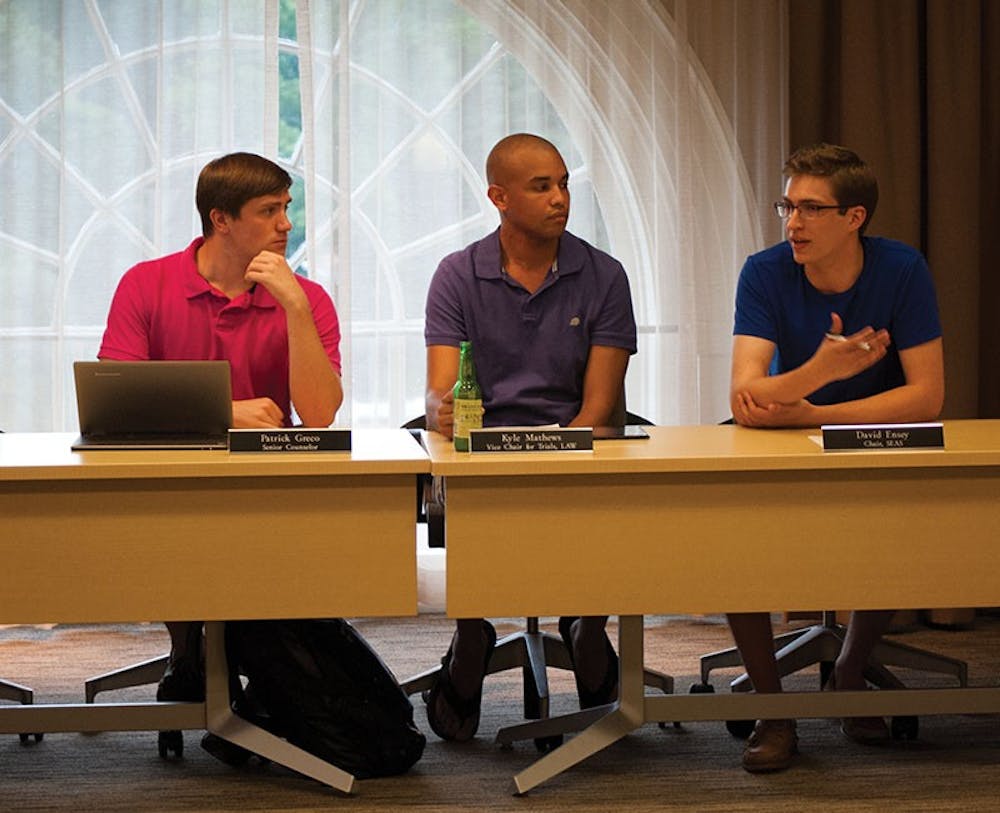During its first general body meeting of the semester, the University Judiciary Committee discussed reducing the size of the First-Year Judiciary Committee and making accompanying changes to the organization’s training methods.
FYJC, a branch of UJC with jurisdiction exclusively over incidents occurring in first-year areas, currently has 17 members. The UJC executive committee’s proposed reduction in membership would require a restructuring of current bylaws and a vote by the Judiciary Committee.
Fourth-year College student Sean McAuliffe, UJC vice chair for first-years, said this proposal was because of a drop in the number of cases brought before the first-year committee in recent years.
Co-chair for first-year areas Taylor Locks, a fourth-year College student, said Residence Life staff is focused on educating residents, not punishing them, and as such they do not report every incident to UJC. “I know UJC’s main concern right now is with underage drinking,” she said. “With that, we generally don’t report first-time violations because we see it as part of the educational process.”
That lack of reporting for first-time violations reduces case backlog but can also result in less exposure to casework for new FYJC members. “[FYJC members] aren’t able to be really active in UJC, despite their obvious talent,” McAuliffe said. “Making the pool slightly smaller would give them more opportunity.”
Residence Life staff also assesses the impact a certain situation may have on the community before deciding which incidents to report, Locks said. “One of the changes we made is that we now report party hosts or severe incidents to UJC on a first-time basis,” Locks said.
UJC Chair David Ensey, a fourth-year Engineering student, said the drop in reported cases was the result of changes not only with Residence Life, but within the Judiciary Committee rules as well.
The Judiciary Committee altered internal rules to allow first-time offenses by permitting them to go before an FYJC hearing panel with the permission of the FYJC chair and vice-chair. Hearing panels require a lighter workload for judges and are heard by only three judges, not the usual five.
“The mechanics of a hearing panel don’t allow judges to get as much exposure as opposed to a trial,” Ensey said. The reduction in cases has caused FYJC members to go half a semester or a whole semester without hearing a case, he said.
In addition to reducing the number of members of FYJC, the committee also proposed creating a shadowing program so FYJC members could learn from general UJC support officers and gain exposure to a wider variety of cases. Under the new proposal, FYJC members would shadow current UJC counselors, advisors and educators while simultaneously completing their work as FYJC judges.
Several current members of FYJC have already expressed enthusiasm for the opportunity to shadow while working cases, McAuliffe said.
This change is an executive decision and would not require a bylaw change.
Selection for this academic year’s FYJC is scheduled to be complete by Sept. 20, and Ensey said the Judiciary Committee would make a final determination on the rule changes before then. The Committee is likely to vote on the proposed changes on Sept. 15.







